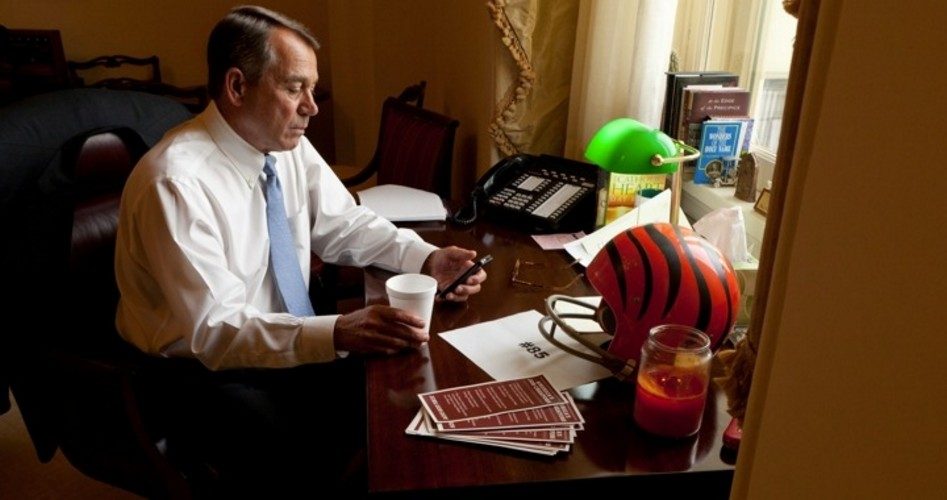
On Tuesday, December 18, Republican House Speaker John Boehner spelled out some of the details on his “Plan B” offer to the White House in case Plan A goes nowhere. It appears that Plan B will go nowhere as well, but not because of resistance from the White House, but from other House Republicans who are intent on keeping their word.
According to Boehner’s office, Plan B, “does not raise taxes. It is a net tax cut that prevents a $4.6 trillion tax hike on January 1.”
But there is a tax increase in his plan after all:
[Plan B] permanently extends income tax rate cuts [the Bush tax cuts] for Americans making less than $1 million, which protects 99.81 percent of all taxpayers.
So there it is: Boehner’s Plan A doesn’t raise taxes, but then again it does. But only on those making $1 million a year or more. It’s just a little caving in, just a little surrender, just a little blinking in the game of chess. As Erick Erickson wrote in his diary at RedState.com:
Only among the mendacious cast of clowns in Washington can those two bullet points be reconciled together. John Boehner’s plan does raise taxes. But it only does so on people who earn one million dollars or more. He obfuscates this because taxes are set to automatically go up in January. Therefore, by preventing taxes from going up on 99.81% of Americans and letting a tax increase happen anyway, he can claim his plan “does not raise taxes.”
[It’s] that type of mendacity [that] got us to this point.
Indeed. Since Boehner became Speaker of the House on January 5, 2011, he has guided his members to allow government debt (under the Constitution all spending bills begin in the House) to increase from $14.1 trillion to $16.4 trillion as of Friday, December 14, which works out to be an increase of almost $19,000 per household in America. And this from a House that had staunchly defended its position, and signed the Taxpayer Protection Pledge to prove their sincerity: “[I will] oppose any and all efforts to increase the marginal income tax rates for individuals and/or businesses.”
But in the grand game of chess going on between Boehner and the White House, Boehner explains that Plan B “does not include anything on the debt [ceiling] or other non-tax policy items.” Translation: We’re focusing here, folks, on raising taxes. We’re hoping that the White House will go along with some conversations in the future about spending cuts. “Remember,” wrote Boehner, “[my] rule on the debt limit still applies: spending cuts must exceed any debt limit increase.”
There are a lot of moving parts in this chess game: The extension of federal unemployment insurance benefits, extension of the Alternative Minimum Tax “fix” to protect taxpayers from being taxed just because inflation moves them into a higher tax bracket, increases in capital gains taxes, increases in taxes on dividends, increases in the Estate and Gift Taxes, Section 179 “expensing” provisions for small business write-offs, “sequestration” which provides for mandatory but modest cuts to military and “discretionary” government spending, and, of course, the impending debt-ceiling debate as government spending approaches its current limit.
By moving the chess piece marked “tax increase ok” across the board to the White House, Boehner hopes that the president will give a little on entitlement spending. At the moment, Obama has agreed to $400 billion in such cuts but a long way from the $1 trillion Boehner is hoping for.
During closed-door “confidential” (no taxpayers allowed) meetings, Boehner has offered to kick the can on the debt ceiling down the road 12 months, giving Obama enough room to continue spending without restraint, while Obama has come back from his “give me unlimited power over the debt ceiling” demands and countered with a two-year debt-ceiling extension.
The immediate reaction to Plan B by Senate Majority Leader Harry Reid was essentially, “No thanks, but keep trying.” And the two do keep trying. They have had three closed-door meetings in the last eight days, plus unnumbered phone calls back and forth.
With nearly all the focus on raising taxes, spending cuts have received precious little air time. But spending cuts are critical. As popular author and libertarian John Stossel expressed it:
Ludicrous, irresponsible spending is why we’re in trouble….
The media obsess about tax rates, but spending is more important. As Milton Friedman taught us, spending is a far more accurate gauge of the government burden.
If government spends a dollar, that dollar is taxed away from someone. If it’s borrowed, it’s removed from productive use, setting the stage for higher taxes later.
If the government prints more dollars to fund spending, our purchasing power falls. Transferring purchasing power from the people to the government via inflation is a form of taxation.
Even the Wall Street Journal noted that the chess game is rigged. When Boehner and Obama talk about spending cuts, “those numbers have no real meaning because they are conjured in the wilderness of mirrors that is the federal budget process.”
Paul Greenberg, the Pulitzer Prize winning commentator who writes for the Arkansas Democrat-Gazette, noted cynically that taxpayers have little input into that process, that “our function is just to pay the taxes the big boys decide on.”
There is one bright spot in all of the machinations passing as serious discussion: Several House Republicans have expressed their opinion that if Boehner continues down the road of compromise and obfuscation and surrender, his job as speaker will be jeopardy in the next Congress.
Photo of John Boehner: AP Images
A graduate of Cornell University and a former investment advisor, Bob is a regular contributor to The New American and blogs frequently at www.LightFromTheRight.com, primarily on economics and politics. He can be reached at [email protected].



